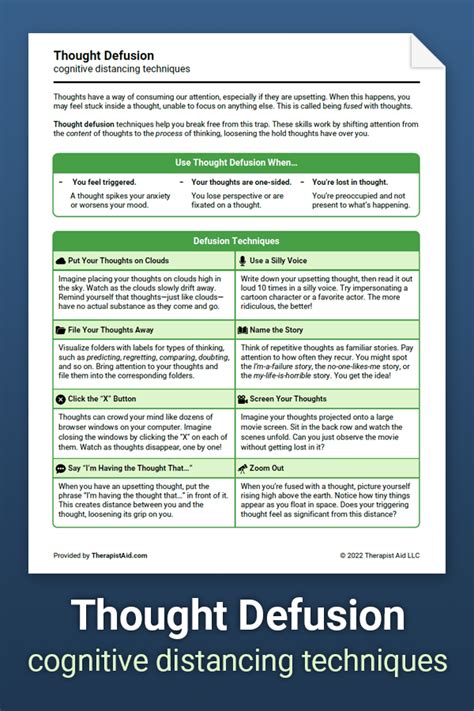7 Ways to Defuse Disturbing Thoughts

Understanding Disturbing Thoughts

Disturbing thoughts can be a distressing and overwhelming experience for many individuals. These thoughts can range from mild anxiety and worry to severe intrusive thoughts that can interfere with daily life. It’s essential to understand that having disturbing thoughts doesn’t mean you’re flawed or weak; it’s a common experience that many people face. In this article, we’ll explore seven ways to defuse disturbing thoughts and regain control over your mental well-being.
1. Mindfulness and Meditation

Mindfulness and meditation are powerful tools for managing disturbing thoughts. By practicing mindfulness, you can become more aware of your thoughts, emotions, and physical sensations without judgment. This increased awareness allows you to recognize when disturbing thoughts arise and take steps to calm your mind. Regular meditation practice can help reduce stress, anxiety, and depression, making it easier to manage disturbing thoughts.
🙏 Note: Start with short meditation sessions, even 5-10 minutes a day, and gradually increase as you become more comfortable with the practice.
2. Grounding Techniques

Grounding techniques can help you focus on the present moment and distract you from disturbing thoughts. These techniques often involve using your senses to ground yourself in reality. For example:
- Pay attention to your breath, noticing the sensation of the air moving in and out of your body.
- Notice the sensation of your feet touching the ground or the chair beneath you.
- Listen to the sounds around you, focusing on the different frequencies and volumes.
- Look at an object, taking in its shape, color, and texture.
By using grounding techniques, you can calm your mind and reduce the intensity of disturbing thoughts.
3. Cognitive-Behavioral Therapy (CBT)

Cognitive-behavioral therapy is a helpful approach for managing disturbing thoughts. CBT focuses on identifying and challenging negative thought patterns, which can contribute to disturbing thoughts. By working with a therapist or using CBT techniques on your own, you can learn to:
- Identify distorted or unhelpful thinking patterns.
- Challenge and reframe negative thoughts.
- Develop more balanced and constructive ways of thinking.
CBT can be an effective way to manage disturbing thoughts and improve overall mental health.
4. Physical Activity

Regular physical activity can have a profound impact on mental health. Exercise can:
- Reduce stress and anxiety.
- Improve mood and overall sense of well-being.
- Enhance cognitive function and focus.
Engaging in physical activity can help distract you from disturbing thoughts and improve your ability to manage them.
5. Creative Expression

Creative expression can be a powerful way to manage disturbing thoughts. Engaging in creative activities like:
- Writing (journaling, poetry, or fiction).
- Art (drawing, painting, or sculpting).
- Music (playing an instrument or composing).
Can help you:
- Process and release emotions related to disturbing thoughts.
- Develop a new perspective on your thoughts and experiences.
- Enhance self-awareness and self-expression.
6. Social Support

Social support from friends, family, or a therapist can be a vital component in managing disturbing thoughts. Talking to someone about your thoughts and feelings can help you:
- Feel heard and understood.
- Gain a new perspective on your experiences.
- Develop coping strategies and techniques.
Don’t be afraid to reach out for support when you’re struggling with disturbing thoughts.
7. Self-Compassion

Practicing self-compassion is essential when dealing with disturbing thoughts. Treat yourself with kindness, understanding, and patience, just as you would a close friend. Remember that:
- Disturbing thoughts are a common experience.
- You’re doing the best you can.
- You deserve kindness and compassion, regardless of your thoughts.
By cultivating self-compassion, you can develop a more positive and supportive relationship with yourself, making it easier to manage disturbing thoughts.
As you work through these strategies, remember that managing disturbing thoughts takes time, patience, and practice. Be gentle with yourself, and don’t hesitate to seek help when you need it.
In the journey of managing disturbing thoughts, it’s essential to remember that you’re not alone, and there is hope for healing and growth.
What are disturbing thoughts?

+
Disturbing thoughts are unwanted, intrusive, and often distressing thoughts that can interfere with daily life. They can range from mild anxiety and worry to severe intrusive thoughts.
How can I stop disturbing thoughts?

+
While it’s challenging to completely eliminate disturbing thoughts, you can learn to manage them using techniques like mindfulness, grounding, CBT, physical activity, creative expression, social support, and self-compassion.
Can disturbing thoughts be a sign of a mental health condition?

+
Yes, disturbing thoughts can be a symptom of various mental health conditions, such as anxiety disorders, depression, post-traumatic stress disorder (PTSD), and obsessive-compulsive disorder (OCD). If you’re struggling with disturbing thoughts, it’s essential to consult with a mental health professional for proper diagnosis and treatment.
Related Terms:
- Thought defusion worksheet pdf
- Thought defusion worksheet pdf free
- Thought defusion worksheet free
- Thought defusion worksheet for adults
- Thought defusion exercises
- Thought defusion examples